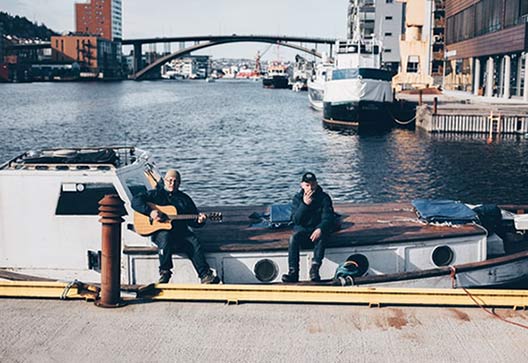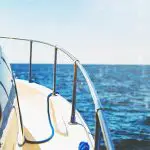For thousands of years, mariners have taken along musicians on long voyages at sea to entertain the crew, relieve stress, and generally improve the mood onboard by listening to music from home.
Although it may seem that a ship’s musician isn’t as essential to the safety and operation of the vessel as a bosun or helmsman, many captains refused to leave port without at least one accomplished musician aboard. They understood the important role that music played in keeping the crew happily working.
Today, most vessels have replaced the onboard fiddler or lute player with a modern sound system and a set of high-powered waterproof speakers. But if you look around, you will find that there are still a significant number of vessels that have been equipped with a guitar or a ukulele.
Yachts and cruise ships often employ professional musicians for performances at sea, and there are many sailors who are also talented musicians. In the end, recorded music cannot replace the energy and authenticity of live music.
When I first started crewing boats across the Pacific, I never set foot on a boat without my own musical instrument. As a teenager, I often paid my way around the world by playing my violin or guitar, and more than once I relied on busking money to find my way home from a foreign port.
In this article, we are going to explore musical instruments onboard boats. If you are interested in including live music as part of your boating experience, keep reading!
Contents
Benefits of Playing Music At Sea
There are many reasons for taking along musical instruments on a voyage at sea. In this section, we will explore some of the greatest benefits of playing music on your boat, as well as a few downsides to keep in mind.
Pros:
- Playing music at sea is a great way to meet other boaters and bond over shared interests in music. It’s always an extra bonus when the other boaters are musicians. There’s nothing like an impromptu jam session on the water!
- Playing music can be an excellent way to fill the extra time at sea. Sometimes there is an abundance of extra time on a long sea passage, and there is no better way to keep the crew happy and entertained than by playing live music on the high seas.
- If you like to invite other boaters over for dinner and drinks, a bit of live music at the end of the evening is the perfect way to cap a great day on the water.
- Sailors often spend long periods of time stuck together in a relatively small space. Playing music can relieve tension and improve crew morale after a stressful day.
- If the musicians on your vessel are talented, playing gigs or busking in port along the way can be a nice way to earn some extra money on the way to help cover the expenses of the cruise.
Cons:
- Music only improves morale if the musicians are good. Every musician knows that there is nothing worse than someone who thinks they can play the violin but can’t!
- The marine environment can be hard on musical instruments, especially if you use electronic ones. If your boat isn’t watertight or if the humidity is bad inside the cabin, it might be a good idea to leave your musical instruments at home.
- Sometimes loud music can irritate other boaters nearby, so make sure to keep the volume low if you aren’t entirely sure all the other boats nearby are enthusiastic about your music.
What Types of Instruments Are Ideal for Use On Boats
There are a wide variety of sailors around the world and many of them are also talented musicians. The selection of instruments that sailors choose to play is as diverse as the boaters themselves.
That said, guitars remain a favorite instrument at sea, and they are by far the most common instrument to be found on boats all over the world, so we will focus more on guitars than other instruments in this article.

You will be hard-pressed to find a port anywhere in the world without at least one guitar on of the vessels moored in the harbor.
Guitars are a favorite instrument for boaters because they can be cheap and easy to obtain, they are popular all over the world, so you can always find someone who knows how to play a tune on one, and they are easy to pack away in a lazaretto or storage locker.
Of course, you can also find many other instruments onboard boats as well. Another popular favorite among boaters is the ukulele. Ukuleles are great because they are easy to play and their small size makes them very convenient to bring along to dinner on another boat or a cruiser’s barbecue on the beach.
Since they are so small, they are a perfect choice for small boat owners who don’t have any extra space for larger instruments.
Many people associate the fiddle with tall ships, and indeed many ships from the days of sail always kept a fiddler on board to improve crew morale. That’s why so many fiddle tunes are about ships and the sea.
Today, fiddles are less popular onboard boats than they once were, but any talented musician and boater who brings along their fiddle will be sure to draw the attention of the entire port.
When it comes to other musical instruments to bring along at sea, the sky’s the limit. I have met sailors who played accordion, cello, the keyboard, mandolin, banjo, trumpet, flute, drums, the jaw harp, and a wide variety of other instruments.
Things to Keep In Mind While Playing Music On the Water
Playing music at sea can go a long way towards improving the quality of your cruise, but there are a variety of things to keep in mind to make sure that the music is a great experience for everybody.
Below are some things to keep in mind before taking your musical instruments along on your next boating adventure.
- Unless you have arranged a performance for the other cruisers in the port, try to keep the volume down, especially late in the evening or early in the day. Of course, offshore this isn’t a problem. In the middle of the ocean, you can do whatever you want, including playing music as loud as you please.
- If you play instruments that use an electric pickup, bring along a set of headphones to use when the other crew members need to concentrate on navigating the boat or when they are focusing on another task.
- Try to protect your instruments from major fluctuations in the environment, like heat, cold and extreme humidity. It’s a good idea to stow your instruments in watertight containers where the humidity can be controlled.
- If you play electric instruments, make sure that your boat’s electrical system can handle the power requirements without regularly running the engine to charge the batteries. You may need to expand the battery bank and think about adding wind or solar energy to cope with the increased power demands.
- Don’t forget about maintenance. Most musical instruments require regular upkeep to keep them in tip-top condition, especially in a marine environment. Onboard your boat, you will likely need to pay extra attention to your instruments so that they are always ready to play.
Electric Instruments At Sea
Typically, boaters choose to bring acoustic instruments on boating trips to keep things as simple as possible. But hardcore electric musicians may wonder if it’s a good idea to bring along their electric guitar or keyboard (or another electrified instrument) to sea.
This depends entirely on the type of boat you will be sailing on, where you plan to go, the onboard electrical system, and your musical setup. Here are a few things to keep in mind if you are thinking about taking an electric musical instrument to sea.
- Think about the boat’s power system. Does the vessel have a battery bank that can handle the loads required to play your instruments without having to run the engine to charge the batteries?
- Can the battery bank be charged via wind or solar, so that you won’t have to worry about a noisy engine getting in the way of your music?
- Is there plenty of space on board for the amps, power cords, and other necessary equipment for your electric instrument?
- Will water and condensation pose a danger to the instrument and electronics?
- Will you be sailing in areas where it makes sense to play this type of music on your boat? Do the captain and other crew approve of your electronic music setup? Do you have headphones and a way to practice without disrupting the crew when they need to be listening to the weather and for other ships?
Summary
For thousands of years, musical instruments have played an important yet underrated role in keeping crew healthy and happy onboard boats.
Music tends to improve mood, and this translates to improved mental health which makes it easier to run a smooth ship. Playing music at sea is a great way to meet other boaters and entertain guests, and can even be an opportunity to earn a few extra dollars on your boating adventure.
If you take the time to keep your instruments in top shape and play music at the appropriate times, music onboard is guaranteed to bring joy to everyone on your boat!






